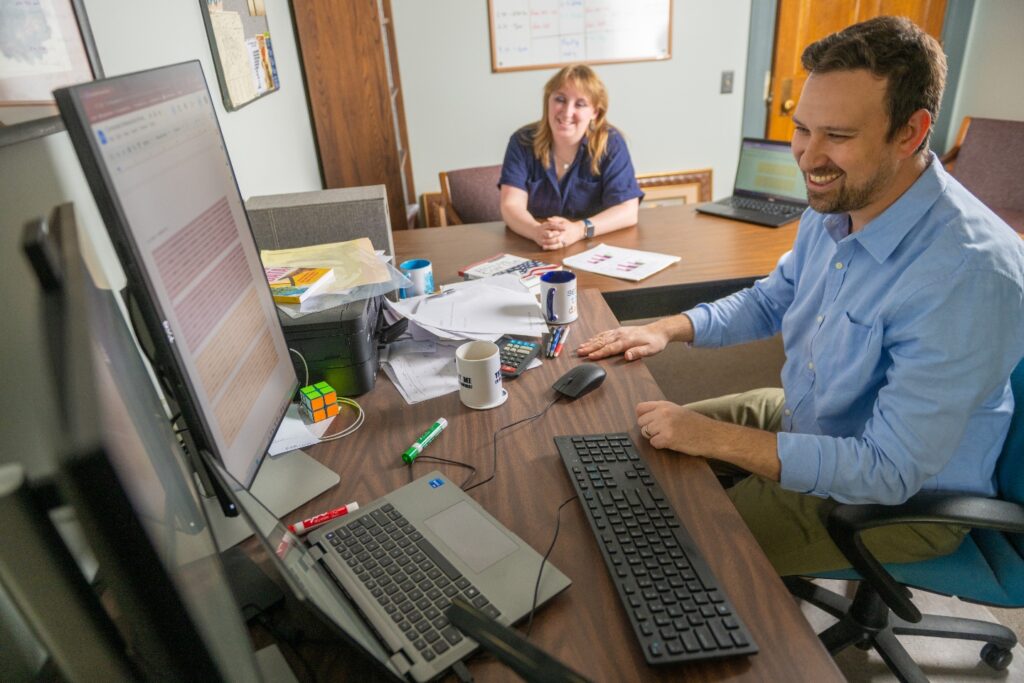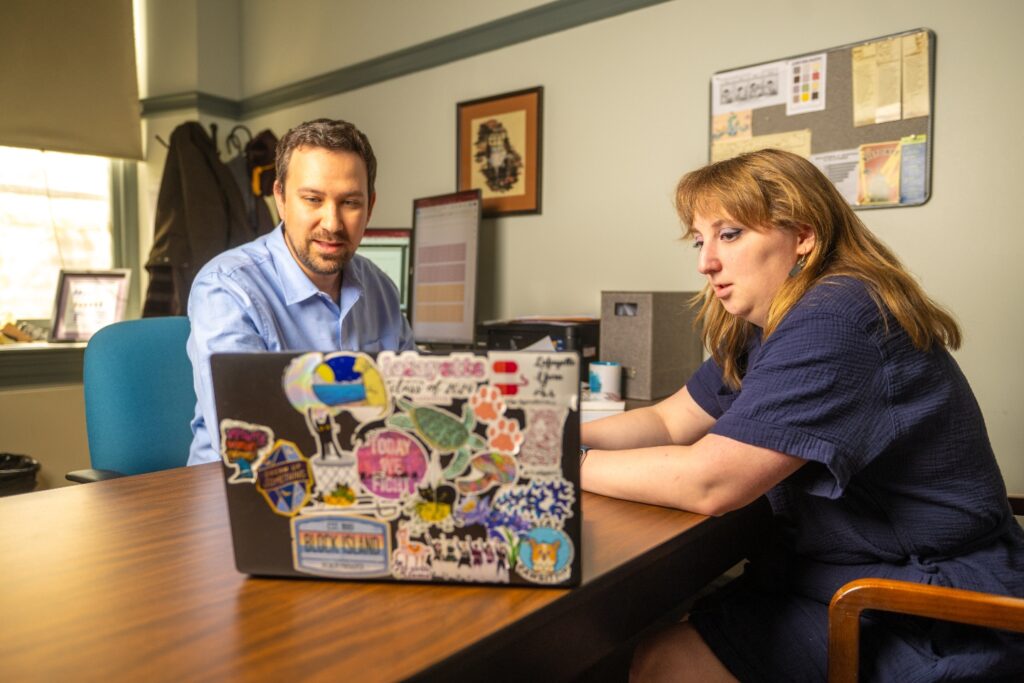Student, faculty research sheds light on mental health care disparities
By Bryan Hay
Making the most of her Lafayette experience and its power to effect positive change, Ainsley Carlson ’24 has shared her research about systemic inequalities in mental health care on campus and among academics, legislators, clinical professionals, and policymakers.
Working directly with Adam Biener, assistant professor of economics, Carlson (mathematics and economics) used statistical models and federal survey data to document mental health care disparities by race/ethnicity, sex, and sexual orientation.
Carlson’s interest in the topic combines elements from her personal journey and her initial encounter with Biener as a first-year student.
“Coming into college, I was really interested in mental health care. My first introduction to using economics to study mental health care disparities was actually from Prof. Biener’s microeconomics course I took with him three years ago, then a paper I wrote for his health economics class.” says the EXCEL Scholar.

Research by Ainsley Carlson ’24 and Adam Biener, assistant professor of economics, shows mental health care disparities
“At the same time, I was dealing with my own mental health struggles,” Carlson adds. “I realized many people can have a negative experience with mental health care and that not all treatment experiences are necessarily good.
“I wanted to research how people of different races and ethnicities, genders, and sexual orientations don’t always get the best access to appropriate therapy or other mental health treatments,” says Carlson, who started looking at data during a microeconometrics course last year with David Stifel, Charles A. Dana Professor of Economics and department head.
“As Ainsley worked to fulfill a data ethics requirement for a minor program, it occurred to me that there are a lot of ethical issues with the way we think about mental health care appropriateness and mental health care disparities,” says Biener, whose research interests include racial and social disparities in health care.
“Ainsley went deep into the National Survey on Drug Use and Health, a big federal survey on people’s mental health and use of mental health care services. It became clear that not only were these ethical issues worth working through, but they could inform a very good model of disparities that would help us understand where and why people may not get the care they need. It’s not just their race and ethnicity, but their sexual orientation as well.”
Carlson notes their research supports other research that has found people who are Black, Hispanic, heterosexual, and/or men tend to avoid mental health care for different reasons, such as the stigmas society places on it.
“We have to acknowledge that there’s a history of weaponizing mental illness against certain groups of people,” she says. “Making sure there’s diverse practitioners is one consideration, and we also need to understand it’s not just the mental health system that needs reforming. There are also cultural issues that need to be addressed.”
“What’s really novel about this research is there have been studies of racial and ethnic disparities in health care use and access,” Biener observes. “We understand that Blacks, Hispanics, and members of other racial and ethnic groups face a mixture of discriminatory barriers and socioeconomic disadvantages that add up to cause these unfair differences, but there is no good study that tries to understand the way these disparities intersect with sexual orientation.”
Their findings show that compared to heterosexual men and women, gay/lesbian and bisexual men and women have higher rates of mental health care use, but that there are large unfair differences in access by race and ethnicity within each sexual orientation and gender group.

Ainsley Carlson ’24 and Adam Biener, assistant professor of economics, review their work.
“What Ainsley has been doing is thinking about when you hear a phrase like intersectional lens, and you say these words, what does it really mean? How does this enter a math model?” Biener adds. “It’s got something to do with the fact that if I am a gay, Black man or if I’m a straight, white female, or some combination of these things, that amounts to a very different life experience.”
Carlson had a rare opportunity to share her work with the esteemed Vanderbilt University economist Christopher S. “Kitt” Carpenter, who met with Carlson and Biener during his visit to Lafayette in April. Their work about disparities in mental health care was of great interest to Carpenter, founder and director of the Vanderbilt LGBTQ+ Policy Lab.
In addition to presenting her findings to Carpenter, Carlson has shared her work with state legislators, Lafayette faculty, officials at Lehigh Valley Economic Development Corp., and during a Hanson Center for Inclusive STEM Education program on systemic inequities in health and health care. Carlson also represented Lafayette at a gathering of statewide undergraduates hosted at the Pennsylvania State Capitol.
Right after graduation, she’ll be at West Chester University pursuing a master’s degree in applied statistics. She plans to work as a statistician or in data science in the health care industry.
For her, the undergraduate experience at Lafayette was fulfilling, with an opportunity to work alongside a professor whose research interests align with her own and make a difference in people’s lives, all hallmarks of a Lafayette education.
“The one thing I would want is to change perceptions of mental health treatment and help others understand that mental health treatment has more of a community aspect to it,” Carlson says. “People seeking mental health care need a community that supports them. If this work helps achieve that, it’d be great.”

